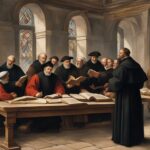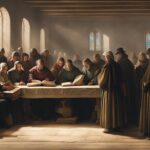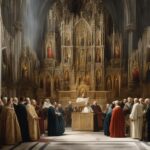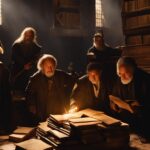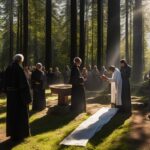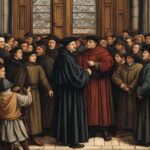The Christian Reformed Church is a vibrant and influential religious organization with a rich history rooted in the principles of Christianity. As a Protestant Calvinist Christian denomination, it has played a significant role in shaping the faith community and spiritual journey of its members.
The origins of the Christian Reformed Church can be traced back to the Reformation of the sixteenth century, when significant theological and ecclesiastical changes swept across Europe and transformed the landscape of Christianity. It was during this time that leaders like John Calvin emerged, emphasizing the importance of predestination, the sovereignty of God, and the authority of scripture.
In 1857, Dutch immigrants who sought religious freedom and a better life settled in the United States, particularly in Michigan and Iowa. These immigrants, led by pastors A.C. Van Raalte and Hendrik Scholte, established the Christian Reformed Church as a separate entity from the Reformed Church in America (RCA). They saw the need for a church that was committed to maintaining true piety and adhering to Reformed orthodoxy.
Throughout its history, the Christian Reformed Church has grown and evolved, becoming a diverse denomination with a global presence. Today, it serves as a beacon of faith for thousands of Christ followers, fostering a community that embraces the teachings of Jesus and seeks to live out His love in the world.
Key Takeaways:
- The Christian Reformed Church has its roots in the Reformation of the sixteenth century and was founded by Dutch immigrants in 1857.
- It is a Protestant Calvinist Christian denomination that is committed to the Bible as the guide for faith and practice.
- The Christian Reformed Church practices two sacraments: baptism and communion, which play vital roles in their worship services.
- The leadership of the Christian Reformed Church includes pastors, elders, and deacons.
- The worship practices of the Christian Reformed Church place a strong emphasis on the Word of God and incorporate biblical teachings into sermons and hymns.
Origins and Migration
The Christian Reformed Church has a rich history rooted in the migration of Dutch immigrants to the United States in the mid-19th century. These immigrants faced religious persecution and economic hardships in their homeland, seeking better opportunities and freedom elsewhere.
Led by pastors A.C. Van Raalte and Hendrik Scholte, a group of Dutch immigrants settled in Michigan and Iowa. Their motivation to leave the Netherlands stemmed from the desire to escape religious persecution and find economic stability.
“We left our homeland not only in search of economic opportunity but also to establish a national church that aligns with our beliefs, free from the influence of the Reformed Church in America,” says Pastor A.C. Van Raalte.
The separation from the Reformed Church in America in 1857 allowed the Dutch immigrants to establish their own church with a strong commitment to their Reformed orthodoxy and true piety. This marked the formation of the Christian Reformed Church, a religious community that thrived amidst the challenges of starting afresh in a new land.
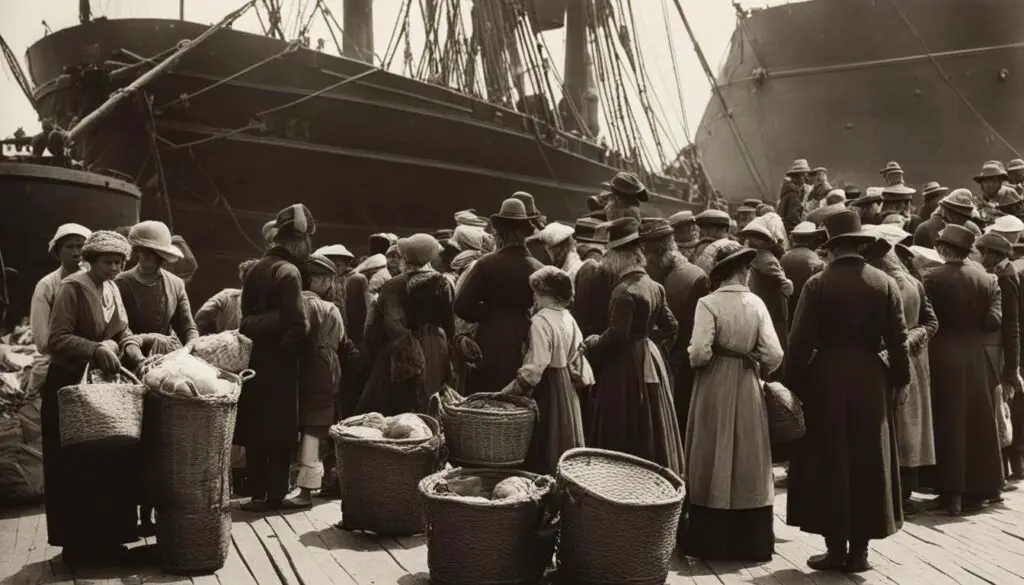
Beliefs and Doctrines
At the core of the Christian Reformed Church’s teachings are the beliefs and doctrines rooted in the theological tradition of Calvinism. Drawing inspiration from the influential writings of John Calvin, the church holds steadfast to the sovereignty of God, predestination, and the concept of election.
Calvinism, as embraced by the Christian Reformed Church, emphasizes that salvation is solely a gift from God, granted by His grace to those who have been chosen. It teaches that humans, bound by sin, are incapable of saving themselves and rely entirely on God’s mercy and grace for redemption.
The doctrine of predestination, an integral part of Calvinism, asserts that God, in His infinite wisdom and foreknowledge, predetermined those who would be saved. This concept brings immense comfort to believers, assuring them that their salvation is secure in God’s hands.
“We believe that all who trust in Jesus Christ as Savior are chosen by God and called to faith by the power of the Holy Spirit. This divine election is not based on merit or human effort but rests solely on God’s loving purpose and good pleasure.”
The Christian Reformed Church also places great importance on the transformative power of God’s grace. It recognizes that no amount of human efforts can earn salvation, emphasizing that good works are a natural response to the unmerited favor and love received from God.
This understanding of grace and salvation forms the foundation of the Christian Reformed Church’s beliefs. It shapes how its members live out their faith, striving to serve others and reflect God’s love in their daily lives.
Key Beliefs and Doctrines
| Beliefs and Doctrines | Description |
|---|---|
| Sovereignty of God | God is all-powerful and in control of all things. |
| Predestination | God has chosen those who will be saved. |
| Election | Salvation is granted to those whom God has chosen. |
| Grace | Salvation is a gift from God, not earned through human effort. |
| Salvation | Received through faith in Jesus Christ as the Savior. |

Sacraments and Rituals
In the Christian Reformed Church, sacraments and rituals play a significant role in the worship practices of its faith community. These sacred practices serve as powerful symbols of faith and spiritual nourishment, connecting believers to the teachings of Jesus Christ. The two primary sacraments observed in the Christian Reformed Church are baptism and communion. Let’s explore these sacraments and the rituals associated with them.
Baptism: The Sign of Initiation
Baptism holds a central place in the Christian Reformed Church, serving as a profound symbol of initiation into the Christian faith. Through baptism, individuals publicly declare their commitment to follow Christ and become a part of the faith community. It signifies a spiritual rebirth and the cleansing of sin, symbolized by the act of immersion in water or the pouring of water over the head.
During baptism, the congregation witnesses and celebrates as individuals publicly profess their faith, affirming their belief in Jesus Christ as their Lord and Savior. It is a joyous occasion that marks the beginning of a lifelong journey of faith and discipleship. Baptism is often accompanied by prayers, hymns, and readings from Scripture, creating a meaningful and sacred experience for both the individual and the community.
Communion: Remembering Christ’s Sacrifice
Communion, also known as the Lord’s Supper or the Eucharist, is another significant sacrament in the Christian Reformed Church. It is a ritual that commemorates the death and resurrection of Jesus Christ and the spiritual nourishment that comes through His sacrifice. During communion, believers partake in the shared elements of bread and wine (or grape juice), representing Christ’s body and blood.
Communion serves as a powerful reminder of God’s love and grace, as well as a time of reflection and self-examination. It is a solemn yet celebratory act that unites believers with Christ and with one another. The Christian Reformed Church often observes communion during worship services, inviting all baptized believers to participate and experience the spiritual significance of this sacrament.
Additional Rituals and Worship Practices
Alongside the sacraments of baptism and communion, the Christian Reformed Church incorporates various rituals and worship practices into its services. These practices are designed to facilitate meaningful connections with God and foster spiritual growth within the faith community.
Prayer: Prayer is an essential part of worship in the Christian Reformed Church. It allows individuals to communicate with God, seek His guidance, and express their needs and desires.
Hymn Singing: Hymns and songs of worship are sung during services to express praise, gratitude, and devotion to God. They often draw inspiration from Scripture and provide a collective voice for the congregation.
Scripture Reading: The reading of Scripture plays a vital role in Christian Reformed Church worship services. Selected passages from the Bible are read aloud, providing spiritual nourishment, instruction, and inspiration to the worshipers.
These rituals, along with others unique to individual congregations, contribute to the rich tapestry of worship practices in the Christian Reformed Church. They serve as a means for believers to engage with God, deepen their faith, and experience the presence of the Holy Spirit in their lives.

Leadership and Clergy
In the Christian Reformed Church, leadership plays a vital role in guiding and nurturing the faith community. Pastors, elders, and deacons are integral to the spiritual well-being of congregations, providing support, guidance, and care to members.
“The true measure of leadership is the ability to serve with humility and compassion.” – Pastor James Anderson
At the forefront of this leadership structure are the pastors, who serve as spiritual leaders within the church. They are ordained individuals who have received theological education and are called to shepherd the congregation. Pastors lead worship services, deliver sermons, administer sacraments like baptism and communion, and provide pastoral care to the members.
Elders and deacons, on the other hand, play a supportive role in the church leadership. Elders are elected by the congregation, and their primary responsibility is to assist and support the pastors in their spiritual leadership. They provide wisdom, guidance, and spiritual oversight, ensuring the well-being of the congregation. Deacons, also elected by the congregation, are responsible for acts of mercy and service within the church community and beyond.
Together, pastors, elders, and deacons form a cohesive unit that enables effective leadership and care within the Christian Reformed Church. Their collective efforts contribute to the spiritual growth, nurture, and well-being of the community.
Responsibilities of Church Leaders:
- Provide spiritual guidance and support to the congregation
- Lead worship services and deliver sermons
- Administer sacraments such as baptism and communion
- Offer pastoral care and counseling to church members
- Lead and participate in church committees and decision-making processes
- Engage in outreach and community service initiatives
Qualities of Effective Church Leaders:
- Strong faith and commitment to the teachings of Christ
- Excellent communication and interpersonal skills
- Empathy and compassion for others
- Ability to listen and provide guidance without judgment
- Humility and servant leadership mindset
- Wisdom and discernment in decision-making
| Role | Responsibilities | Qualifications |
|---|---|---|
| Pastors | Lead worship services, deliver sermons, provide pastoral care | Ordained, theological education |
| Elders | Support pastors, offer spiritual guidance, provide oversight | Elected by congregation |
| Deacons | Engage in acts of mercy and service within the community | Elected by congregation |

Worship Practices
The Christian Reformed Church values worship as a central part of its faith community. The church’s worship practices are designed to honor God, engage believers, and foster spiritual growth.
One of the focal points in the worship service is an open Bible on the pulpit, symbolizing the church’s commitment to the Word of God. The sermon takes center stage, where pastors deliver messages based on biblical teachings, guiding congregants in their spiritual journeys. The sermons provide biblical insight, encouragement, and practical application for daily life.
Hymns and songs hold a significant place in worship services. These musical expressions are deeply rooted in Scripture, with lyrics that reflect biblical truths and themes. Through congregational singing, believers offer praises to God, connect with the message of the sermons, and unite their hearts in worship.
“Let the message of Christ dwell among you richly as you teach and admonish one another with all wisdom through psalms, hymns, and songs from the Spirit, singing to God with gratitude in your hearts.” – Colossians 3:16
Beyond sermons and hymn singing, the Christian Reformed Church incorporates other worship practices to engage the congregation. These practices may include prayers, responsive readings, liturgical elements, and the reading of Scripture. Each element of the worship service aims to create an atmosphere of reverence, connection with God, and spiritual growth.
The Christian Reformed Church understands that worship is not limited to the church building and Sunday services. It emphasizes the importance of worship as a way of life, where believers seek to honor and serve God in all aspects of their daily routines. This biblical focus on worship permeates the church’s teachings and community life.

Benefits of Worship Practices
The Christian Reformed Church recognizes several benefits of its worship practices:
- Connection with God: Worship provides a sacred space where believers can encounter God, express their love and devotion, and seek His guidance and presence.
- Growth in Faith: Through worship practices, believers deepen their understanding of Scripture, grow in their faith, and develop a closer relationship with God.
- Community Building: Worship services foster a sense of community, where believers gather to worship, support one another, and experience unity in Christ.
- Witness to Others: Vibrant and meaningful worship practices can be a powerful testimony to non-believers, showcasing the transformative power of the Gospel.
Overall, the worship practices of the Christian Reformed Church are designed to engage the hearts, minds, and spirits of its members, allowing them to grow in their relationship with God and live out their faith in their day-to-day lives.
Sacred Texts
The Christian Reformed Church holds the Bible as its sacred text, considering it the ultimate authority in matters of faith and practice. The Scripture, consisting of the Old and New Testaments, serves as the foundation of the church’s beliefs, doctrines, and teachings.
The Bible is revered as a divine revelation and a written account of God’s interaction with humanity, offering guidance, wisdom, and inspiration to believers. It is cherished as a testament of God’s love, grace, and truth, providing a moral compass and a source of comfort and hope in times of joy and hardship.
“The Bible is alive, it speaks to me; it has feet, it runs after me; it has hands, it lays hold of me!” – Martin Luther
Through the study, meditation, and interpretation of the Bible, the Christian Reformed Church seeks to understand God’s will and discern how to live in accordance with His teachings. Scripture is incorporated into worship services, sermons, and various church activities, allowing believers to engage with the Word of God and deepen their relationship with Him.
By embracing the Bible as their sacred text, members of the Christian Reformed Church strive to align their lives and actions with the principles and values established by God, ultimately seeking to fulfill their call to be faithful followers of Jesus Christ.
Comparison of Scripture Translations Used by the Christian Reformed Church
| Translation | Description |
|---|---|
| New International Version (NIV) | A popular, contemporary English translation that balances readability and accuracy. |
| English Standard Version (ESV) | A more literal translation that prioritizes word-for-word accuracy. |
| New Revised Standard Version (NRSV) | A scholarly translation with inclusive language and ecumenical acceptance. |
| King James Version (KJV) | A classic translation known for its poetic language, often used for traditional purposes. |
Denominations and Sects
The Christian Reformed Church is part of the Reformed tradition within Protestantism. While there may be theological similarities, each denomination and sect has its own distinct practices and beliefs. Let’s take a closer look at some of the denominations and sects related to the Christian Reformed Church:
- Reformed Church in America (RCA): This is another major Reformed denomination in the United States, also tracing its roots back to Dutch immigrants. The RCA shares historical ties with the Christian Reformed Church, but the two denominations developed separately due to theological and cultural differences.
- Protestant Reformed Churches: This is a smaller denomination that emerged from the Christian Reformed Church in the early 20th century. The Protestant Reformed Churches adhere to a stricter interpretation of Calvinist theology, particularly regarding the doctrine of predestination.
- United Reformed Churches (URC): The URC is a relatively recent denomination that was formed in 1996 through a merger of various Reformed congregations. The URC seeks to unite churches within the Reformed tradition while emphasizing biblical fidelity and confessional integrity.
It is important to note that while these denominations and sects may have differences, they share a common commitment to the Reformed theological tradition and its core principles.
| Denomination | Year Founded | Key Beliefs |
|---|---|---|
| Christian Reformed Church | 1857 | Calvinist theology, emphasis on the authority of Scripture |
| Reformed Church in America (RCA) | 1628 | Reformed theology, ecumenical approach, emphasis on social justice |
| Protestant Reformed Churches | 1924 | Highly doctrinal, emphasis on predestination and divine sovereignty |
| United Reformed Churches (URC) | 1996 | Reformed theology, confessional adherence, focus on church unity |
Community and Outreach
The Christian Reformed Church is committed to fostering a strong sense of community and engaging in meaningful outreach initiatives. It recognizes the importance of supporting Christian education and offers various programs to help families grow spiritually.
Christian Education
The Christian Reformed Church understands the significance of education in nurturing a strong faith foundation. It supports Christian schools, providing students with an environment that integrates biblical teachings into their academic pursuits. Through these schools, the church aims to cultivate well-rounded individuals who are equipped to navigate the complexities of the world while staying rooted in their Christian beliefs.
Church Programs
Within its congregations, the Christian Reformed Church offers a range of programs and activities to promote spiritual growth and build community connections. These programs cater to all age groups, from children and youth to adults and seniors. Through Bible studies, discipleship classes, prayer groups, and fellowship gatherings, members have opportunities to deepen their understanding of Christian principles and form lasting bonds with fellow believers.
Outreach Initiatives
Beyond its immediate community, the Christian Reformed Church actively engages in various forms of outreach. It recognizes the importance of social justice and endeavors to address systemic issues through advocacy and action. The church supports missionary work, both locally and internationally, sending individuals and teams to share the message of Christ’s love with different cultures and communities. Additionally, the Christian Reformed Church initiates community service projects that seek to meet the practical needs of those who may be marginalized or facing challenging circumstances.
Quoting Church Member, Emma Johnson:
“Being part of the Christian Reformed Church has allowed me to be actively involved in my local community. Through volunteering opportunities and outreach initiatives, I have witnessed the transformative power of God’s love in the lives of those we serve. It is a privilege to be part of a church that values both spiritual growth and making a difference in the world.”
| Community and Outreach Programs | Impact |
|---|---|
| Christian Schools Support | Empowers students with a strong Christian foundation |
| Church Programs for All Ages | Facilitates spiritual growth and fosters community bonds |
| Social Justice Initiatives | Addresses systemic issues and advocates for change |
| Missionary Work | Shares the message of Christ’s love with diverse cultures |
| Community Service Projects | Provides practical assistance to those in need |
Architectural and Artistic Features
The Christian Reformed Church takes pride in its stunning church buildings that showcase remarkable architectural and artistic features. These structures not only serve as places of worship but also reflect the unique styles and traditions of their respective communities.
One characteristic element found in many Christian Reformed Church buildings is the use of stained glass windows. These windows, crafted with vibrant colored glass, depict biblical scenes, religious symbols, and significant events in Christian history. The interplay of light and color through these windows creates a serene and mystical atmosphere, adding to the spiritual experience of worshippers.
Another notable artistic feature is the intricate woodwork found in the church interiors. Elaborate wooden carvings adorn the pews, altars, and pulpit, showcasing the craftsmanship of dedicated artisans. These intricate details not only contribute to the aesthetic appeal of the space but also represent the meticulous attention to detail and devotion in the Christian faith.
In addition to stained glass windows and woodwork, Christian Reformed Church buildings may include other artistic elements such as paintings, murals, and sculptures. These artworks often depict biblical figures, saints, or significant moments in Christian history. They serve as visual reminders of the faith and inspire worshipers in their spiritual journey.
Overall, the architectural and artistic features of Christian Reformed Church buildings create a sacred space that enhances the worship experience. The combination of stained glass windows, intricate woodwork, and other artistic elements transports believers into a realm of spiritual contemplation and reverence.
Contemporary Issues and Challenges
The Christian Reformed Church, like many religious organizations, faces contemporary issues and challenges in the modern world. These challenges arise from the complex intersection of faith and society, and they require thoughtful engagement and adaptation from the church community.
One of the key challenges for the Christian Reformed Church is navigating theological debates that arise in the ever-evolving society. As societal norms, values, and understandings change, questions emerge about the interpretation and application of scripture in addressing contemporary issues. The church must engage in thoughtful and respectful dialogue to navigate these debates while remaining true to its core beliefs and doctrines.
Furthermore, the Christian Reformed Church seeks to address social justice issues that affect society. It recognizes the importance of promoting equality, justice, and compassion, and actively engages in efforts to combat racism, poverty, and other forms of injustice. The church seeks to bring about transformation and make a positive impact in society.
The changing cultural norms in society also present challenges for the Christian Reformed Church. As societal values and practices shift, the church must find ways to address these changes and communicate its timeless message in ways that resonate with contemporary society. It strives to foster a relevant faith that engages with the needs and concerns of individuals in a rapidly changing world.
In facing these contemporary issues and challenges, the Christian Reformed Church remains committed to its faith and seeks to live out its mission in the world. It acknowledges the complexity of these challenges and the need for continued discernment and adaptation. By remaining faithful to its beliefs while engaging with society, the church endeavors to be a positive and transformative presence in the world.
| Contemporary Issues | Challenges |
|---|---|
| 1. Theological debates on interpreting scripture in light of societal changes | 1. Navigating changing societal norms while remaining faithful to core beliefs |
| 2. Addressing social justice issues such as racism and poverty | 2. Promoting equality and justice in society |
| 3. Adapting to changing cultural norms and communicating the faith effectively | 3. Resonating with contemporary society while staying true to timeless beliefs |
Conclusion
The Christian Reformed Church, with its rich history rooted in the Reformation and the experiences of Dutch immigrants, has established itself as a faithful and vibrant Christian denomination. Guided by strong beliefs and doctrines based on the teachings of John Calvin, the church remains committed to the Word of God as the cornerstone of its worship practices.
Through the sacraments of baptism and communion, the Christian Reformed Church provides opportunities for believers to express their faith and participate in the central aspects of Christian life and community. The church’s leadership, comprised of pastors, elders, and deacons, plays a vital role in guiding and nurturing its members.
As a faith community, the Christian Reformed Church places a strong emphasis on outreach and community engagement. It actively seeks to serve and reach out to its community through various programs, including Christian education, social justice initiatives, missionary work, and community service projects.
While the Christian Reformed Church faces contemporary challenges and societal changes, it remains steadfast in its dedication to its faith and mission. With its beautiful architectural and artistic features, the church provides a sacred space for believers to worship God and find spiritual solace.
FAQ
What is the history of the Christian Reformed Church?
The Christian Reformed Church has its roots in the Reformation of the sixteenth century and was founded by Dutch immigrants in 1857. It is a Protestant Calvinist Christian denomination with a strong commitment to the Bible as the guide for faith and practice.
How did the Christian Reformed Church originate and migrate?
The Christian Reformed Church traces its origins to Dutch immigrants who left the Netherlands due to religious persecution and economic hardships. Led by pastors A.C. Van Raalte and Hendrik Scholte, these immigrants settled in Michigan and Iowa in the mid-19th century. They separated from the Reformed Church in America (RCA) in 1857, seeing it as straying from true piety and Reformed orthodoxy.
What are the beliefs and doctrines of the Christian Reformed Church?
The Christian Reformed Church follows the teachings of John Calvin and embraces key Calvinist doctrines, such as the sovereignty of God, predestination, and election. The church believes that salvation is a gift from God and that good works are a response to this gift. It also emphasizes the importance of God’s grace in the lives of believers.
What sacraments and rituals does the Christian Reformed Church practice?
The Christian Reformed Church practices two sacraments: baptism and communion. Baptism is seen as a sign of initiation into the Christian faith, while communion is a commemoration of Christ’s sacrifice. Worship services often include these sacraments, along with other rituals such as prayer, hymn singing, and the reading of Scripture.
What is the leadership structure of the Christian Reformed Church?
The Christian Reformed Church has a hierarchical leadership structure, with pastors serving as spiritual leaders of congregations. Elders and deacons provide additional leadership and care for the church community. Pastors are typically ordained and receive theological education, while elders and deacons are elected by the congregation.
What are the worship practices of the Christian Reformed Church?
The Christian Reformed Church places a strong emphasis on the Word of God in its worship services. The focal point is often an open Bible on the pulpit, and the sermon plays a central role. Hymns and songs are based on Scripture and are sung to praise and worship God.
What is the sacred text of the Christian Reformed Church?
The Bible is considered the sacred text and is central to the Christian Reformed Church. It is seen as the authoritative guide for faith and practice, and its teachings shape the beliefs and doctrines of the church.
How does the Christian Reformed Church differ from other denominations and sects?
The Christian Reformed Church is part of the Reformed tradition within Protestantism. It is distinct from other denominations and sects, such as the Reformed Church in America (RCA) and the Protestant Reformed Churches. While there may be theological similarities, each denomination has its own distinct practices and beliefs.
What is the emphasis on community and outreach in the Christian Reformed Church?
The Christian Reformed Church places a strong emphasis on community and outreach. The church supports Christian schools and offers programs to help families grow spiritually. It also engages in various forms of outreach to the broader community, such as social justice initiatives, missionary work, and community service projects.
What are the architectural and artistic features of Christian Reformed Church buildings?
Christian Reformed Church buildings often reflect the architectural styles and artistic traditions of the communities they serve. They may feature stained glass windows, intricate woodwork, and other artistic elements that enhance the worship experience and create a sacred space for believers.
What contemporary issues and challenges does the Christian Reformed Church face?
The Christian Reformed Church, like many religious organizations, faces contemporary issues and challenges in the modern world. These may include theological debates, dealing with societal changes, addressing social justice issues, and engaging with changing cultural norms. The church strives to remain faithful to its beliefs while adapting to the needs of its members and the world around it.


